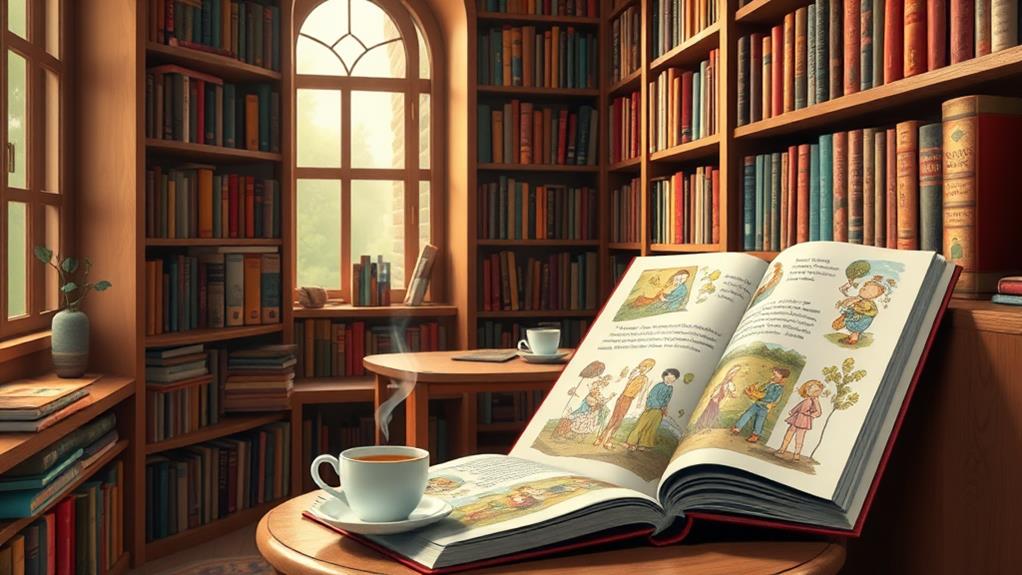You're about to discover the ultimate literary bucket list with 1001 must-read books before you die. This curated selection blends classics and contemporary works, offering a diverse range of themes, genres, and voices. Whether it's the haunting exploration in "Never Let Me Go" or the gripping survival tale in "The Road," each entry comes with a brief summary to ignite your curiosity. You'll also find an author index for easier navigation. This list not only expands your literary horizons but encourages meaningful discussions about the stories that shape our world. Stick around, and you'll uncover even more insights!
Overview of the 1001 Books List
The "1001 Books You Must Read Before You Die" list offers a curated selection of essential literary works spanning centuries, compiled from Peter Boxall's anthology. This impressive compilation features titles from various genres and authors, encouraging you to explore both classic and contemporary literature.
Among the myriad of choices, you'll discover profound narratives that investigate the resilience of the human spirit, such as Louis Zamperini's survival tale in Unbroken, making this list a treasure trove for those seeking inspiration. You'll find works labeled with suffixes, like 'a' for the 2008 edition and 'b' for the 2010 edition, showcasing updates and changes in the selections over time.
Each book in the 1001 Books You Must Read includes a brief summary of around 300 words, designed to engage you and spark your interest in diving deeper into these literary treasures. The anthology is structured to include an author index and a general index, making it easier for you to navigate through the vast literary landscape.
Whether you're a casual reader or a literary scholar, this list serves as a valuable resource. It not only highlights significant works but also invites you to discover timeless stories and themes that resonate across generations.
Notable Books From the 2000S
When you think about notable books from the 2000s, several award-winning modern classics come to mind. Works like "Never Let Me Go" and "The Road" not only explore dystopian themes but also challenge your understanding of humanity and survival.
These stories provide a rich landscape for examining identity and the consequences of our actions, much like the survival journey depicted in Pi's resilience.
Additionally, books such as "Life of Pi" investigate the complexities of faith and morality, prompting readers to reflect on their own beliefs in the face of adversity.
Award-Winning Modern Classics
Among the literary treasures of the 2000s, award-winning modern classics stand out for their profound exploration of the human experience.
These are books you must read to truly understand the complexities of life and identity. Kazuo Ishiguro's "Never Let Me Go," published in 2005, invites you into a haunting world where humanity and identity are deeply examined.
In 2001, Michael Chabon's "The Amazing Adventures of Kavalier & Clay" won the Pulitzer Prize for its rich portrayal of Jewish cousins crafting comic books during World War II.
Jeffrey Eugenides' "Middlesex," a 2003 Pulitzer Prize winner, intricately weaves themes of identity and family heritage through the eyes of an intersex protagonist.
Cormac McCarthy's "The Road," awarded the Pulitzer Prize in 2007, presents a chilling dystopian tale focused on survival and the bond between father and son.
Finally, Ian McEwan's "Atonement," celebrated for its innovative narrative structure, received numerous accolades and found success as an award-winning film in 2007.
These compelling narratives aren't just stories; they're essential experiences that resonate long after you turn the last page.
Dystopian Themes Exploration
Dystopian themes have taken center stage in contemporary literature, with several remarkable works from the 2000s pushing boundaries and sparking critical dialogue. If you're keen for an engaging dystopian themes exploration, you must read Kazuo Ishiguro's "Never Let Me Go." This poignant novel explores the moral implications of cloning, challenging your perceptions of humanity and fragility.
Cormac McCarthy's "The Road" is another must-read, delivering a harrowing glimpse into a post-apocalyptic world where survival reigns supreme. Its stark prose will leave you contemplating the depths of despair and resilience.
Don't overlook David Mitchell's "Cloud Atlas," which weaves multiple narratives across time and space, illuminating the interconnectedness of human experiences. It cleverly highlights oppression and resistance, making it a significant addition to your reading list.
While Suzanne Collins' "The Hunger Games" series isn't on the 1001 list, it exemplifies the 2000s' rise of dystopian literature. Through its focus on totalitarianism and societal stratification, it reflects real-world anxieties about the future.
These works not only entertain but also engage you in crucial conversations about contemporary social issues.
Key Authors Featured

In the domain of contemporary literature, several key authors stand out for their thought-provoking narratives and unique styles. You must read Kazuo Ishiguro, whose novel "Never Let Me Go" dives deep into themes of humanity and the ethical dilemmas surrounding cloning, encouraging readers to engage in self-reflection and mindfulness about the implications of such advancements.
Ian McEwan's "Atonement" is another must-read; his intricate narrative structure explores the complexities of love and guilt, leaving readers questioning the nature of truth.
Don't miss Zadie Smith, celebrated for her diverse narratives and sharp cultural commentary, particularly in "On Beauty," where she tackles race and class in modern society.
Paul Auster's works, especially "The New York Trilogy," are essential for their metafictional approach and existential themes, offering a unique lens through which to view our reality.
Lastly, Salman Rushdie should be on your list; his novel "The Moor's Last Sigh" masterfully blends magical realism with political commentary, addressing identity and cultural conflict in an engrossing manner.
These authors not only expand your literary horizons but also challenge you to think critically about the world around you. Embrace their works—you won't regret it!
Trends in Contemporary Literature
Contemporary literature reflects a dynamic landscape, showcasing a variety of trends that resonate with today's readers. One significant trend is the rise of dystopian themes, as seen in Cormac McCarthy's Pulitzer Prize-winning novel "The Road." This genre captivates you by exploring bleak futures and societal critiques.
Another trend is the exploration of identity and multiculturalism, with authors like Zadie Smith offering diverse narratives that reflect our global society. Additionally, the popularity of historical mystery novels, such as The Daughters of Night, highlights the interest in intricate plots that weave together rich historical details and complex characters.
You'll also notice the blending of genres becoming increasingly popular. David Mitchell's "Cloud Atlas" is a prime example, merging science fiction, historical fiction, and fantasy into a cohesive story. This genre-bending approach keeps you engaged by challenging traditional storytelling boundaries.
Moreover, contemporary literature places a strong emphasis on psychological depth and character development. Writers such as Ian McEwan craft intricate plots that explore the complexities of human emotions, making the characters relatable and profound.
Importance of Reading the List

Reading the "1001 Books You Must Read Before You Die" list is essential for any literary enthusiast who wants to expand their horizons. This curated guide exposes you to a diverse range of critically acclaimed and award-winning works, ensuring you encounter a variety of genres and cultural narratives.
By immersing yourself in this anthology, you'll not only explore significant titles from multiple centuries, but you'll also engage with both classic and contemporary literature. In addition, many of the works reflect the complex interactions between cultures and the impact of historical events, as highlighted in literary exploration of global cultures.
As you navigate through the list, you'll discover new authors and broaden your literary palette, sparking a curiosity that may inspire a lifelong reading habit. Many readers have shared how the list motivates them to set personal reading goals and craft their own lists based on the recommendations.
Moreover, this collection promotes discussion and analysis of contemporary themes in literature, allowing you to appreciate the art of storytelling on a deeper level. You must read these essential works to enrich your understanding of literature and to participate in meaningful conversations about the narratives that shape our world.
Reader Experience and Engagement
Engaging with *1001 Books You Must Read Before You Die* transforms the reading experience into an exciting journey of discovery. As you browse through its diverse selections, you'll likely find yourself spending hours flipping through pages, uncovering new titles that pique your interest.
Each entry includes a succinct 300-word summary, inviting you to explore deeper into the authors and literary genres that resonate with you. This experience is further enriched by the student-centered methodology emphasized in modern reading instruction, which encourages exploration and critical thinking about literature.
The book's visual appeal, enriched by illustrations like author photographs and original book covers, adds another layer to your engagement. You can't help but appreciate how these elements enhance the overall experience, making it more than just a list of books.
Many readers find it a valuable resource, inspiring them to create their own lists of titles to explore. As you mark pages of books you want to immerse yourself in, this anthology promotes a lifelong reading habit and fosters a greater appreciation for literature.
You'll discover that *1001 Books You Must Read Before You Die* isn't just a guide; it's a catalyst for your literary adventures, encouraging you to explore the vast world of books waiting to be uncovered.
Critiques and Omissions

When you look at the "1001 Books You Must Read Before You Die," you can't help but notice the glaring omissions of authors like Ayn Rand and Shirley Jackson.
This raises questions about the personal biases of those who compiled the list and whether it truly represents the diverse voices in literature.
As you explore the selections, consider how the choice of titles impacts the inclusivity and richness of the literary landscape.
Notable Omissions Discussed
Frequently, discussions about the "1001 Books to Read Before You Die" list highlight notable omissions that have left readers and critics debating its completeness. For instance, influential authors like Ayn Rand and Shirley Jackson are conspicuously absent, igniting passionate conversations among literary enthusiasts. Critics argue that such omissions may reflect personal biases or the inherent limitations of curating an extensive anthology.
You might notice that no single compilation can encompass all great literature. This leads to varied opinions on what truly constitutes "must-read" books. The absence of certain classic works raises questions about the representation of diverse genres and themes, which could enrich the literary experience.
For example, fans of horror might feel slighted by the lack of Shirley Jackson, while those who appreciate philosophical explorations may miss Rand's contributions.
Despite these notable omissions, many still find value in the list for its broad array of recommended titles. It encourages you to explore both recognized and lesser-known literary works, inviting you to expand your reading horizons, even if it doesn't cover every significant title.
Balancing the list's recommendations with your own discoveries can make for a fulfilling literary journey.
Personal Bias Considerations
How do personal biases shape our understanding of essential literature? When you explore "1001 Books You Must Read Before You Die," you might notice some glaring omissions. Influential authors like Ayn Rand and Shirley Jackson are absent, sparking debates about the criteria used for selection. Critics argue that personal bias likely plays a role in which books make the cut, highlighting how subjectivity can impact the representation of significant literature.
Readers often have varying opinions on what constitutes "must-read" books, leading to diverse perspectives on the anthology's choices. While it features notable works from the 2000s, like "Never Let Me Go" and "The Road," some believe that other contemporary authors deserved a spot. This discrepancy showcases how personal preferences can skew our understanding of literary importance.
Despite its flaws, "1001 Books You Must Read Before You Die" serves as a valuable resource. It not only introduces you to new titles but also ignites conversations about literary inclusivity and representation.
Diverse Literary Voices
Amidst the extensive collection of titles in "1001 Books You Must Read Before You Die," glaring omissions highlight the need for diverse literary voices. Critics point out that significant works by influential authors like Ayn Rand and Shirley Jackson are missing, creating a perceived gap in the anthology's coverage. This absence raises questions about the selection criteria, as the list reflects the biases of its editors and contributors.
The subjective nature of what constitutes "must-read" literature becomes evident when you consider the diverse literary voices that remain unheard. The limitations of the format might've excluded essential narratives from various backgrounds, ultimately affecting the representation of global literature.
Readers often recognize that personal biases likely influence the choices made, prompting discussions about which voices deserve a place on such a list.
In an age where diverse narratives are vital for understanding the human experience, it's imperative to challenge the traditional literary canon. By acknowledging these critiques, you can appreciate the importance of seeking out and celebrating works from underrepresented authors.
After all, a truly enriching literary journey involves exploring a wide array of perspectives.
Conclusion
In closing, diving into this dazzling list of 1001 books can transform your reading routine. You'll discover delightful narratives, explore extraordinary authors, and immerse yourself in the immense variety of contemporary literature. Embrace the experience, as each page turns into a portal of possibilities, inviting you to ponder profound ideas. So, don't hesitate—grab a book, initiate this exhilarating expedition, and let the literary landscape reshape your world. Happy reading!



